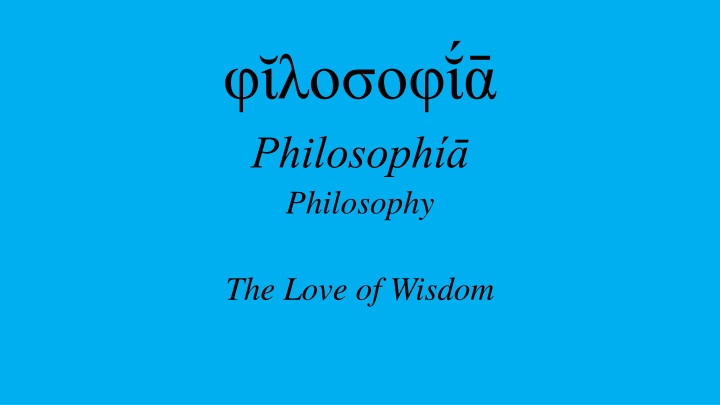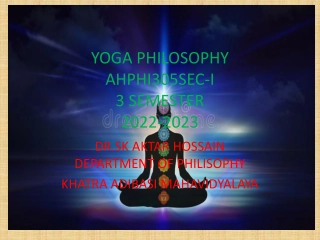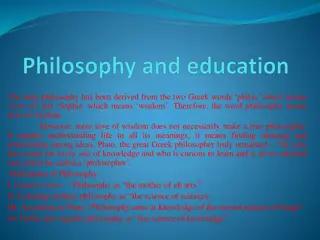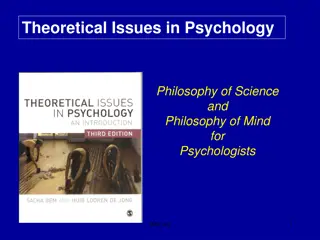Philosophy: Branches & Areas
Philosophy delves into metaphysics, epistemology, ethics, and more. Explore the essence of reality, knowledge, and moral values in this insightful discourse.
Download Presentation

Please find below an Image/Link to download the presentation.
The content on the website is provided AS IS for your information and personal use only. It may not be sold, licensed, or shared on other websites without obtaining consent from the author.If you encounter any issues during the download, it is possible that the publisher has removed the file from their server.
You are allowed to download the files provided on this website for personal or commercial use, subject to the condition that they are used lawfully. All files are the property of their respective owners.
The content on the website is provided AS IS for your information and personal use only. It may not be sold, licensed, or shared on other websites without obtaining consent from the author.
E N D
Presentation Transcript
Platos Five Regimes In The Republic we have Plato s ranking of the types of governments in descending order: Aristocracy: rule of the best, from aristokratia ( ), aristos best + kratia power , rule Timocracy: power of honored, from t mokrat a ( ), tim honor + kratia power , rule Oligarchy: rule by the few, from oligarkh a ( ), ol gos few + archia rule Democracy: power of the people, from d mokrati , ( ), d mos people + kratia power Tyranny: rule by a tyrant, from turannia ( ), turannos tyrant , an absolute ruler unrestrained by law
What is the Relationship? Philosophy Science Art Literature Religion
Branches or Areas of Philosophy Metaphysics This word comes from the title of Aristotle s text: Meta ta phusika (after the physics) This branch of philosophy explores the nature of reality. Just what is the nature of reality? What is real? There have been many different attempts to answer this question, but the two most popular approaches are monism and dualism. Monism is the view that reality consists of just one kind of thing. Dualism is the view that reality consists of fundamentally two different kinds of things. Another important metaphysical question is whether reality is fundamentally unchanging or changing. Metaphysics also includes questions about God s existence and the nature of the self. Does God exist? What is the nature of God s existence? What is the self? Is there such a thing as an immortal soul, or is the self just this mortal body? Is the mind or soul different from the body?
Branches or Areas of Philosophy Epistemology The Study of Knowledge or Theory of Knowledge From the Greek epist m ( ) knowledge and l gos ( ) logy , the study of . How do we know what we know? What is knowledge? Is knowledge possible? The main divisions within epistemology: Rationalism, we know reality through the use of reason alone. Empiricism, we know reality through the senses. Skepticism, which claims that we really cannot know anything. Epistemology is also concerned with the question of truth. What is truth? Is truth discovered or created? Is truth of a belief a matter of a correspondence to reality, the coherence with our other beliefs, or the pragmatic usefulness of the belief?
Branches or Areas of Philosophy Ethics This branch of philosophy concerns moral values. The main division within ethics is between: Absolutism, the view that there is one correct ethical system of moral values for all people. Relativism, the view that moral values are simply relative to different cultures in different times and places, or, perhaps even relative to different individuals.
Branches or Areas of Philosophy Social & Political Philosophy This branch of philosophy focuses on practical social and political questions like: What is the ideal society or form of government? Can the idea of government be rationally justified, or must all governments be irrational? Do humans have any political duties or social obligations? Under what conditions? Are there such things as natural social rights? Can such rights be justifiably removed as a form of punishment? What is one s obligation to obey the law?
Branches or Areas of Philosophy Aesthetics Philosophy of Art This branch of philosophy concerns the theory of art, or more narrowly, the theory of beauty. In the Philosophy of Art one examines questions like: What is art, and how does one determine the difference between art and non-art? How can one make evaluative judgments of works of art? Is there an objective standard by which the relative value of artworks can be evaluated or is this simply a matter of individual taste? What is art for? What is the importance of art in society?
Branches or Areas of Philosophy Logic Reasoning Logic, the most specialized branch of philosophy, is the study of argument or reasoning. In this study one examines the structure of arguments in order to distinguish valid patterns from invalid patterns of reasoning.























